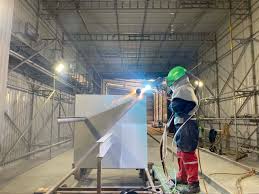Metal Coatings: Enhancing Durability and Performance
Metal is an essential material across countless industries, from automotive manufacturing to construction. However, its durability and performance can diminish over time due to wear, corrosion, and environmental exposure. Enter metal coatings—an innovative solution that extends the life and functionality of metals while optimizing their performance.
What Are Metal Coatings?
Metal coatings are specialized protective layers applied to metal surfaces. These coatings enhance the material’s physical, chemical, and aesthetic properties, ensuring it can withstand harsh conditions and prolonged use. Whether for industrial machinery or household products, metal coatings play a vital role in safeguarding metal materials and improving their functionality.
Types of Metal Coatings
There is a variety of metal coatings available, each suited to specific applications and goals. Here are the most common types:
- Powder Coatings
- Powder coatings involve electrically charged particles of pigment and resin that are applied to a metal surface and cured using heat.
- These coatings provide a durable, high-quality finish in a range of colors and textures.
- Electroplating
- Electroplating uses an electric current to deposit a thin layer of metal (e.g., chrome, nickel, or gold) onto a workpiece.
- This method improves the metal’s appearance, corrosion resistance, and wear protection.
- Thermal Spray Coatings
- Thermal spraying involves heating and accelerating a coating material, which is sprayed onto a metal surface.
- These coatings are excellent for industrial applications requiring high levels of heat resistance and durability.
- Galvanization
- Most commonly associated with zinc, galvanization protects against rust and corrosion in outdoor environments.
- It’s used in construction and automotive industries.
- Each of these coating types caters to different needs, offering flexibility for various industries and applications.
Benefits of Metal Coatings
Why are metal coatings so adopted? Here’s a closer look at their key advantages:- Corrosion Resistance
- Metal coatings act as a barrier against moisture, oxygen, and chemicals that can cause rust and corrosion. This is valuable in humid or marine environments.
- Enhanced Durability
- With increased resistance to wear and tear, coatings protect materials from scratches, impacts, and heavy use.
- Improved Weather Resistance
- Coatings make metals resilient to temperature fluctuations, UV exposure, and extreme weather conditions, extending their lifespan.
- Aesthetics Improvement
- Decorative coatings improve visual appeal with vibrant colors, metallic finishes, or smooth textures.
- Cost Efficiency
- By reducing the need for repairs and replacements, metal coatings save time and resources long-term.
Applications of Metal Coatings
Metal coatings are versatile, with applications spanning diverse industries. Here are some prominent examples:- Automotive Industry
- Metal coatings protect vehicle components like exhaust systems, wheels, and brake parts from extreme conditions and wear.
- Aerospace
- Aerospace coatings ensure the smooth functioning of aircraft parts by offering high durability and heat resistance.
- Infrastructure
- Bridges, pipelines, and buildings rely on protective coatings to reduce corrosion and increase longevity.
- Household Appliances
- Coatings add protective and aesthetic value to refrigerators, ovens, and washing machines.
- Industrial Machinery
- Metal coatings allow heavy-duty equipment to endure friction, pressure, and environmental exposure.
These examples highlight the essential role that coatings play in maintaining the quality and performance of metal-based products.
Environmental Considerations
While metal coatings deliver numerous benefits, their production and application can have environmental impacts. Concerns include hazardous chemicals, energy consumption, and the use of processes like chemical conversion coating. However, eco-friendly innovations are making sustainability a growing priority in the industry.- Low-VOC Coatings
- Manufacturers are transitioning to coatings with reduced volatile organic compounds, which are less hazardous to both humans and the environment.
- Recyclable Powder Coatings
- Excess powder coating material can be captured and reused, minimizing waste.
- Bio-based Coatings
- Research into plant-based alternatives offers sustainable options for protective coatings.
By adopting these practices, the metal coatings industry is taking strides toward minimizing its ecological footprint.
Future Trends in Metal Coatings
What’s on the horizon for metal coatings? Here are some exciting trends to watch:- Nanocoatings
- These ultra-thin layers offer unmatched durability, self-cleaning properties, and resistance to bacteria, expanding applications in healthcare and food processing.
- Smart Coatings
- Innovations like self-healing coatings and temperature-sensitive finishes are paving the way for adaptive technologies.
- Automation in Application
- The integration of AI and robotics is enhancing coating application techniques for precision and consistency.
The future of metal coatings lies in enhancing sustainability, performance, and functionality, further solidifying their critical role in countless industries.
Conclusion
Metal coatings are transforming how we protect and enhance metal products. Offering corrosion resistance, improved aesthetics, and sustainability, these coatings are essential for durability and performance today.
READ MORE : 6 Highly Successful Business Models

